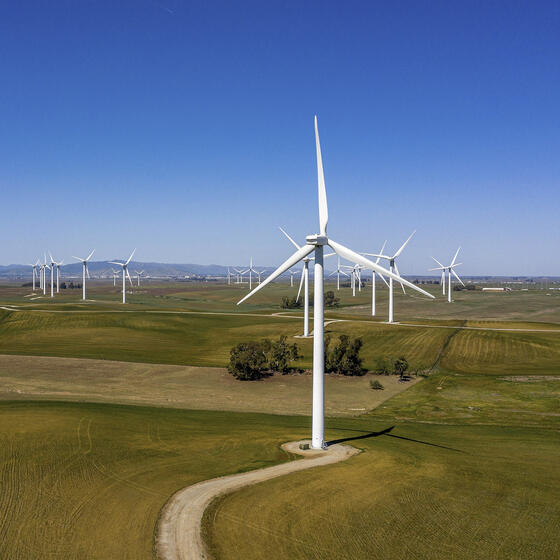How Trust Can Power Renewable Energy
In this series, leaders tell stories about drawing on their core values in critical moments. Lily Donge ’97 talked with us about how building trust is critical for any kind of real innovation—and how it’s helped her develop new models for scaling renewable energy.

A wind farm in Rio Vista, California. Photo: David Paul Morris/Bloomberg via Getty Images.
Negotiating an agreement or a financial transaction, we think of two parties. We shouldn’t forget that space in between. To create the right conditions for a deal, you have to get beyond the binary. Creating “middleness” is how people connect. The truth is, markets rest right in the middle. If it’s B-to-B or B-to-C, markets are the “to.”
I believe in markets as an agent for change and for good. But I’m always aware of who’s at the table and who’s not at the table. I look for how we can innovate and harness markets so people can interact with each other better and not only for financial wealth but for community wealth.
I’m a third-culture kid. I was born in Saigon. My family was very lucky to get out of the country in 1974. We were stateless refugees until the French government granted us citizenship. My sister, brother, and I grew up in the Philippines. My father worked for the Asian Development Bank in Manila.
I came to the U.S. for college, expecting to become an academic focused on economic development. With time, I realized I wanted to take an active role in creating change. I did the pure finance route at Yale SOM.
Through a series of jobs, I developed expertise in natural resource economics. I spent a decade in sustainable investment, spearheading an alternative energy fund, a global water fund, and the first green bond strategy. They were all innovative investment strategies that I helped establish purely from the sheer love of doing things differently in the market.
At Rocky Mountain Institute, we helped develop financial tools to scale renewable energy markets. We used corporations’ ability to take risk to de-risk renewable energy projects through aggregate power purchase agreements (PPA). PPAs were already key to financing renewable energy projects because the guarantee of purchase gives financiers confidence that the project will pay back. If you take it further and aggregate several companies as the purchaser, they collectively have more impact while individually risking less.
“To create any new market, you have to bring together parties that don’t know each other. The fundamentals have to be very sound, but then a key ingredient is trust.”
To create the first “blueprint” for an aggregated PPA, or to create any new market, you have to bring together parties that don’t know each other. The fundamentals have to be very sound, but then a key ingredient is trust.
Enabling trust is an art. We held renewable energy boot camps in Aspen where people could ask anything—dumb questions and hard questions. The transfer of knowledge, exchanging ideas and learning from each other, is an extraordinarily powerful way to build trust. Meeting people face to face, going through an experience together, is another way to build trust.
Those boot camps and gatherings did all of that. The participants developed relationships. Those relationships are now longstanding and foundational connections among big renewable energy buyers. The experience of coming together in a room to think through a problem led to an important aggregated transaction. By building trust to work on a problem together, we moved towards creating billion-dollar deals together. From a few companies doing this, now it is an industry. The acceleration was astonishing.
As that has developed its own momentum, I have started to look at the next space for innovation. For a while I’ve been aware that equity and social issues are never at the table when we’re talking about renewable energy. Bringing in the social component is very difficult. It requires room to explore and question outside of a corporate mindset.
I’ve started to do that during this time where every week feels like a year. With COVID, mass shootings, and all of the racial hatred, there’s definitely darkness. That has had me thinking about my identity as an Asian American woman. It has made me reassess where all of our priorities should be. I think we’re going to be in this in-between stage for a while. Until we can find the middleness, a way to trust.
The darkness also makes me think of Thich Nhat Hanh, a Vietnamese Buddhist monk, saying you cannot have darkness alone. If you have darkness, light is also there already.